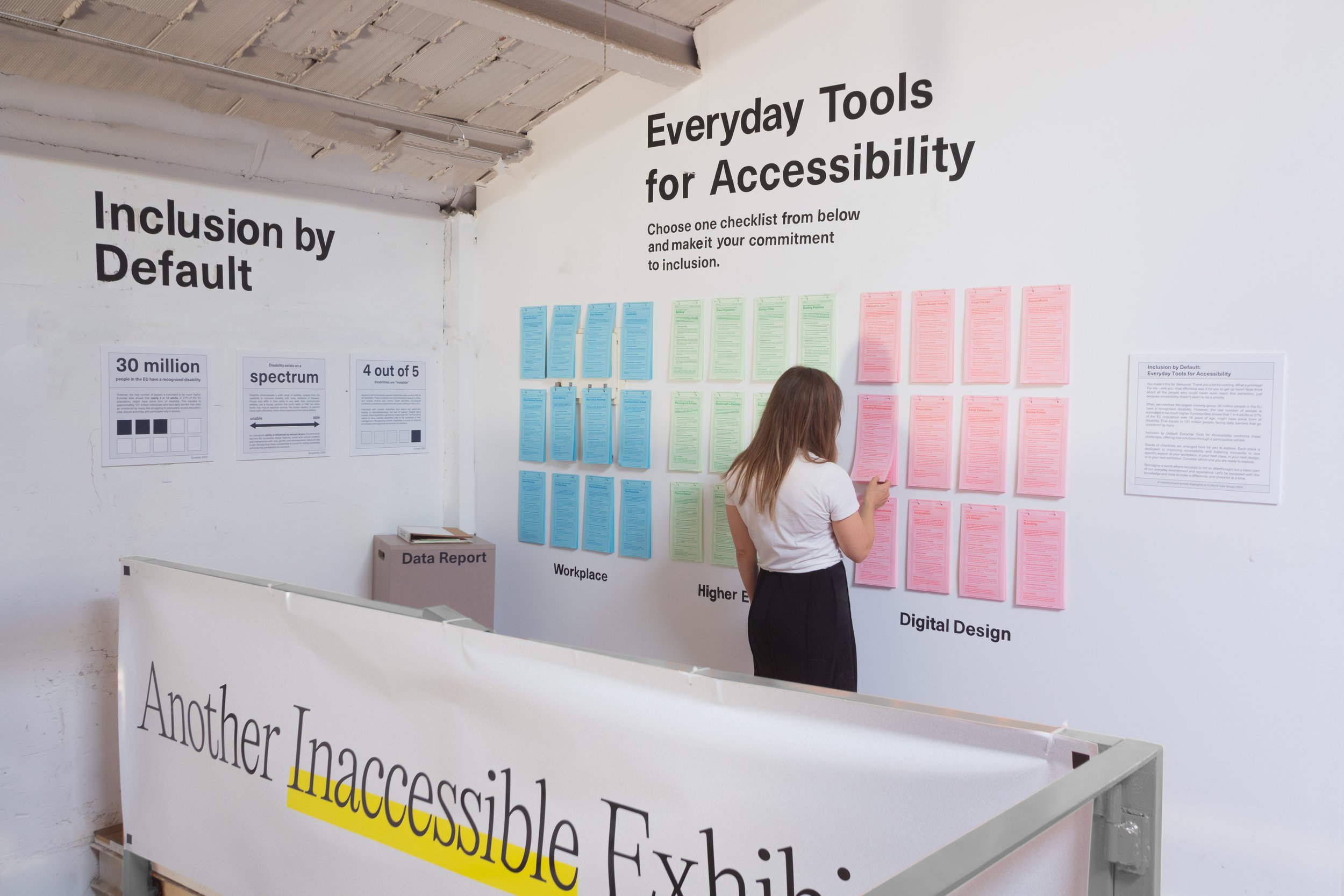More than 1 in 5 people in the EU live with some form of disability,
Facing barriers that go unnoticed by many.
– Eurostat 2023
Reimagine a world where inclusion is not an afterthought but a basic part of every environment and experience.
Inclusion By Default:
Everyday Tools for Accessiblity
The Concept
Checklists for more inclusivity in everyday areas like the workplace, digital design, higher education, or exhibition design. Each checklist is dedicated to improving accessibility and fostering inclusivity in a specific aspect.
Four checklist sets for different areas of life
Each set consists of 12 checklist for more acceessibility and inclusion in its category. Yellow lists for exhibtions, blue lists for workplace, pink lists for digital design and green lists for higher education.

All checklist are organized in the same structure. The category in the top right corner; a heading; a short introduction; 5-7 checklist items and further resources.
Download your Checklist Set
Below you can find all checklists as printable PDFs or screen-reader friendly Google Docs. Make your world more accessible and inclusive, one checklist at a time.
Workplace
Digital Design
Higher Education
Background Information
Understanding Disability
Disability exists on a spectrum
Disability encompasses a wide range of abilities, from full capability to complete inability, with many variations in between. People may differ in their ability to see, walk, hear, communicate verbally, use a mouse, perform fine motor tasks, digest food or filter out noise. Some may require assistive devices, like screen readers, to perform these tasks effectively, while others experience fluctuating abilities.
An individual's ability is influenced by various factors, including environmental barriers, social and cultural contexts, and intersections with race, gender, and socioeconomic status.
Recognizing these complexities is crucial for raising awareness and ensuring accessibility for everyone.
Some More Facts
30 million people in the EU have a recognized disability
However, the actual number of people with disabilities is estimated to be much higher. Eurostat data shows that nearly 3 in 10 adults, or 27% of the EU population, might have some form of disability. This equates to approximately 101 million individuals who face daily barriers that often go unnoticed, like struggling to adequately access education, jobs, leisure activities, and participate fully in society.
4 out of 5 disabilities are “invisible”
Apparent and intermittently apparent disabilities make up about 80% of all disabilities. These conditions are not immediately obvious to others and include chronic pain, mental health disorders, neurological conditions, and sensory impairments like partial hearing or vision loss. Individuals with invisible disabilities face stigma and skepticism, leading to misunderstandings and lack of support. Despite being unseen, these disabilities significantly impact daily life. The fluctuating nature of many invisible disabilities adds to the complexity of their management. Recognizing invisible disabilities is crucial for fostering an inclusive and supportive environment for everyone.
The Exhibtion

"Inclusion by Default" at I’ll Revolt Tomorrow
I presented "Inclusion by Default: Everyday Tools for Accessibility", as an interactive installation addressing the often-overlooked barriers faced by people with disabilities.
A Participatory Experience
Visitors were invited to engage with stacks of accessibility checklists, each dedicated to improving inclusivity in everyday areas—workplaces, digital design, higher education, and exhibitions. The installation encouraged participants to build their own set of checklists, equipping them with practical tools to make accessibility an integral part of their work and daily life.
Beyond the Data: Opening a Conversation
Much like the core question of the exhibition—how do we visualize data without making it an unquestionable truth?—my project positioned accessibility as an ongoing conversation rather than a fixed checklist. By inviting active participation, the installation highlighted that true inclusion is not an afterthought but a responsibility we all share.
I’ll Revolt Tomorrow took place at TDMC Barcelona, June 18-20, 2023, in collaboration with Domestic Data Streamers
Accessibility is not just compliance—it's about creating environments where everyone can participate fully. Inclusion by Default equips individuals and organizations with the knowledge and tools to take action—one checklist at a time.
Share and Improve
All our checklists are shared under a Creative Commons license. We encourage you to use, adapt, and improve these documents. Your feedback is invaluable, so please share your experiences and suggestions for new checklists or areas that need attention.
Academic Paper
If you're interested in reading my academic paper, Inclusion by Default: Everyday Tools for Accessibility in Higher Education, which explores universal design principles and practical strategies for creating inclusive learning environments, feel free to reach out.
Let's collaborate to create a more inclusive world.










